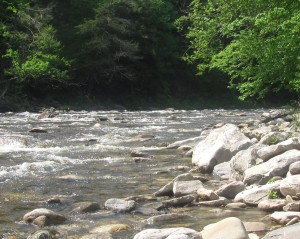Bill would eliminate buffer requirement for Pennsylvania’s cleanest streams
-
Katie Colaneri
Yet another battle of the economy versus the environment is taking place in Harrisburg. This time, conservationists say Pennsylvania’s cleanest streams are at stake.
A bill (HB1565) working its way through the state legislature would eliminate a requirement for 150-foot buffer zones between new developments and specially protected watersheds.
Thick rows of trees and shrubs help keep pollution from washing off buildings and pavement into waterways. However, developers say waterfront property is valuable and 150 feet can be too much to ask for certain projects.
The buffer requirement – passed four years ago under the Rendell administration – only applies to developments that require stormwater discharge permits and that are adjacent to one of Pennsylvania’s “high quality” or “exceptional value” streams. These waterways are often used for recreation and are home to wild brook trout and other species.
“The regulation is very narrow,” said David Hess, a former secretary of the state Department of Environmental Protection. “It really only applies to a small percentage of the watersheds in Pennsylvania and even there, there are a lot of exemptions.”
Developers can apply for waivers from the DEP.
That’s part of the problem, says Gregory Newell, a member of the Pennsylvania Builders Association, which has been lobbying to remove the buffer requirement.
Newell says companies like his Montgomery County-based engineering firm, Nave Newell, Inc., can spend tens of thousands of dollars on a proposal without knowing if regulators will accept their application.
“That takes a considerable amount of time and money and it’s a lot of risk to find out whether you’re going to get it or not,” he said, noting developers still need to use best management practices to maintain water quality.
According to the DEP, the agency has never denied a waiver request. The applicants either satisfied one of six waiver provisions or changed the scope of their projects, said spokeswoman Amanda Witman in an e-mail.
“Their definition of not denying might be [they]’ll allow something, but greatly restricting what it is that you can do in the buffer,” said Newell.
Despite opposition from a number of environmental groups, HB1565 recently cleared a senate committee with support from both parties. If it passes, forested buffers would become an optional tool for preventing stream banks from eroding and preserving water quality. Developers would also be required to offset disturbances within 100 feet of a stream by planting a replacement buffer elsewhere in the same watershed.
Hess, who now works as a lobbyist with the Chesapeake Bay Foundation, says the legislation could compromise Pennsylvania’s ability to protect these special watersheds – putting the state “in hot water” with federal regulators.
“To take away what little protection we have now… would just be a major hole in the whole program of preventing the water quality in these areas from degrading,” he said.
The full senate is expected to take up the bill before the end of the legislative session on Tuesday.

















